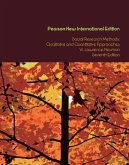Preparing students to do research and understand what research can do.
Basics of Social Research helps students understand what research can and cannot do, become better consumers of research, and learn why properly conducted research is important.
This text teaches students to be better consumers of research results and understand how the research enterprise works, preparing them to conduct small research projects. Upon completing this text, students will gain an awareness of the capabilities and restrictions of research, and learn why properly conducted research is important. Using clear, accessible language and examples from real research, this text discusses both qualitative and quantitative approaches to social research, emphasizing the benefits of combining various approaches.
Learning Goals
Upon completing this book, readers should be able to:
Recognize that social research is simultaneously a very important enterprise and one that is not beyond you – you can understand it
Become better consumers and understand what research can and cannot do
Learn how to properly conducted research
Acquire a foundation for further learning about doing research and understand that this activity requires dedication, creativity, and mature judgment
Features + Benefits
Shows students that social research is a highly important enterprise, and one that is not beyond their abilities.
Uses examples from real research in major studies to show students the origins of the findings and information used in textbooks or the media. (ex. p. 295)
Emphasizes that social research is not a matter of following fixed procedures and routines, but something that requires creativity, mature judgment, personal integrity, and a commitment to free and open inquiry.
Adapted from Social Research Methods: Qualitative and Quantitative Approaches, 7/e by Lawrence Neuman. The text covers the same topics as Social Research Methods but with less technical detail. Material from the 7/e on the historical development of social research, philosophical assumptions for doing research in particular ways, and more sophisticated data gathering and analysis techniques has been largely eliminated.
Create a Custom Text – For enrollments of at least 25, create your own textbook by combining chapters from best-selling Pearson textbooks and/or reading selections in the sequence you want. To begin building your custom text, visit www.pearsoncustomlibrary.com . You may also work with a dedicated Pearson Custom editor to create your ideal text—publishing your own original content or mixing and matching Pearson content. Contact your Pearson Publisher’s Representative to get started.
MySearchLab with eText can be packaged with this text.
MySearchLab provides engaging experiences that personalize learning, and comes from a trusted partner with educational expertise and a deep commitment to helping students and instructors achieve their goals.
eText – Just like the printed text, you can highlight and add notes to the eText or download it to your iPad.
Assessment – Chapter quizzes and flashcards offer immediate feedback and report directly to the gradebook.
Writing and Research – A wide range of writing, grammar and research tools and access to a variety of academic journals, census data, Associated Press newsfeeds, and discipline-specific readings help you hone your writing and research skills.
IN THIS SECTION:
1.) BRIEF
2.) COMPREHENSIVE
BRIEF TABLE OF CONTENTS:
Part I: Foundations
Chapter 1: Doing Social Research
Chapter 2: Theory and Social Research
Chapter 3: Ethics in Social Research
Chapter 4: Reviewing the Scholarly Literature and Planning a Study
Chapter 5: Qualitative and Quantitative Measurement
Chapter 6: Qualitative and Quantitative Sampling
Part II: Conducting Quantitative Research
Chapter 7: Survey Research
Chapter 8: Experimental Research
Chapter 9: Nonreactive Research and Secondary Analysis
Chapter 10: Analysis of Quantitative Data
Part III: Conducting Qualitative Research
Chapter 11: Field Research and Focus Group Research
Chapter 12: Historical-Comparative Research
Chapter 13: Analysis of Qualitative Data
Part IV: Research Reports
Chapter 14: Writing the Research Report
COMPREHENSIVE TABLE OF CONTENTS:
Part I: Foundations
Chapter 1: Doing Social Research
Introduction
Alternatives to Social Research
How Science Works
Steps in the Research Process
Dimensions of Research
Chapter 2: Theory and Social Research
What Is Social Theory?
The Parts of Theory
The Aspects of Theory
The Three Major Approaches to Social Science
The Dynamic Duo
Chapter 3: Ethics in Social Research
What are Research Ethics?
Why Be Ethical?
Power Relations
Ethical Issues Involving Research Participants
Ethics and the Scientific Community
Ethics and the Sponsors of Research
Politics of Research
Value-Free and Objective Research
Chapter 4: Reviewing the Scholarly Literature and Planning a Study
Literature Review
Using the Internet for Social Research
Qualitative and Quantitative Orientations toward Research
Qualitative Design Issues
Quantitative Design Issues
Chapter 5: Qualitative and Quantitative Measurement
Why Measure?
Quantitative and Qualitative Measurement
Parts of the Measurement Process
Reliability and Validity
A Guide to Quantitative Measurement
Chapter 6: Qualitative and Quantitative Sampling
Nonprobability Sampling
Probability Sampling
Part II: Conducting Quantitative Research
Chapter 7: Survey Research
When to use a Survey
The Logic of Survey Research
Constructing the Questionnaire
Types of Surveys: Advantages and Disadvantages
Interviewing
The Ethical Survey
Chapter 8: Experimental Research
Research Questions Appropriate for an Experiment
Random Assignment
Experimental Design Logic
Internal and External Validity
Practical Considerations
Results of Experimental Research: Making Comparisons
A Word on Ethics
Chapter 9: Nonreactive Research and Secondary Analysis
Nonreactive Measurement
Unobtrusive Observation
Content Analysis
Existing Statistics/Documents and Secondary Analysis
Issues of Inference and Theory Testing
Ethical Concerns
Chapter 10: Analysis of Quantitative Data
Dealing with Data
Results with One Variable
Results with Two Variables
More Than Two Variables
Inferential Statistics
Part III: Conducting Qualitative Research
Chapter 11: Field Research and Focus Group Research
Introduction to Field Research
Conducting a Field Research Study
The Field Research Interview
Data Quality
Ethical Dilemmas of Field Research
Focus Group Research
Chapter 12: Analysis of Qualitative Data
Comparing Methods of Data Analysis
Coding and Concept Formation
Analytic Strategies for Qualitative Data
Other Techniques
Software for Qualitative Data
Part IV: Research Reports
Chapter 13: Writing the Research Report
Reasons for Writing
The Writing Process
Steps in Writing
The Quantitative Research Report
The Qualitative Research Report
The Research Proposal
Preparing students to do research and understand what research can do. Basics of Social Research helps students understand what research can and cannot do, become better consumers of research, and learn why properly conducted research is important. This text teaches students to be better consumers of research results and understand how the research enterprise works, preparing them to conduct small research projects. Upon completing this text, students will gain an awareness of the capabilities and restrictions of research, and learn why properly conducted research is important. Using clear, accessible language and examples from real research, this text discusses both qualitative and quantitative approaches to social research, emphasizing the benefits of combining various approaches. Learning Goals Upon completing this book, readers should be able to: * Recognize that social research is simultaneously a very important enterprise and one that is not beyond you ? you can understand it * Become better consumers and understand what research can and cannot do * Learn how to properly conducted research * Acquire a foundation for further learning about doing research and understand that this activity requires dedication, creativity, and mature judgment
Basics of Social Research helps students understand what research can and cannot do, become better consumers of research, and learn why properly conducted research is important.
This text teaches students to be better consumers of research results and understand how the research enterprise works, preparing them to conduct small research projects. Upon completing this text, students will gain an awareness of the capabilities and restrictions of research, and learn why properly conducted research is important. Using clear, accessible language and examples from real research, this text discusses both qualitative and quantitative approaches to social research, emphasizing the benefits of combining various approaches.
Learning Goals
Upon completing this book, readers should be able to:
Recognize that social research is simultaneously a very important enterprise and one that is not beyond you – you can understand it
Become better consumers and understand what research can and cannot do
Learn how to properly conducted research
Acquire a foundation for further learning about doing research and understand that this activity requires dedication, creativity, and mature judgment
Features + Benefits
Shows students that social research is a highly important enterprise, and one that is not beyond their abilities.
Uses examples from real research in major studies to show students the origins of the findings and information used in textbooks or the media. (ex. p. 295)
Emphasizes that social research is not a matter of following fixed procedures and routines, but something that requires creativity, mature judgment, personal integrity, and a commitment to free and open inquiry.
Adapted from Social Research Methods: Qualitative and Quantitative Approaches, 7/e by Lawrence Neuman. The text covers the same topics as Social Research Methods but with less technical detail. Material from the 7/e on the historical development of social research, philosophical assumptions for doing research in particular ways, and more sophisticated data gathering and analysis techniques has been largely eliminated.
Create a Custom Text – For enrollments of at least 25, create your own textbook by combining chapters from best-selling Pearson textbooks and/or reading selections in the sequence you want. To begin building your custom text, visit www.pearsoncustomlibrary.com . You may also work with a dedicated Pearson Custom editor to create your ideal text—publishing your own original content or mixing and matching Pearson content. Contact your Pearson Publisher’s Representative to get started.
MySearchLab with eText can be packaged with this text.
MySearchLab provides engaging experiences that personalize learning, and comes from a trusted partner with educational expertise and a deep commitment to helping students and instructors achieve their goals.
eText – Just like the printed text, you can highlight and add notes to the eText or download it to your iPad.
Assessment – Chapter quizzes and flashcards offer immediate feedback and report directly to the gradebook.
Writing and Research – A wide range of writing, grammar and research tools and access to a variety of academic journals, census data, Associated Press newsfeeds, and discipline-specific readings help you hone your writing and research skills.
IN THIS SECTION:
1.) BRIEF
2.) COMPREHENSIVE
BRIEF TABLE OF CONTENTS:
Part I: Foundations
Chapter 1: Doing Social Research
Chapter 2: Theory and Social Research
Chapter 3: Ethics in Social Research
Chapter 4: Reviewing the Scholarly Literature and Planning a Study
Chapter 5: Qualitative and Quantitative Measurement
Chapter 6: Qualitative and Quantitative Sampling
Part II: Conducting Quantitative Research
Chapter 7: Survey Research
Chapter 8: Experimental Research
Chapter 9: Nonreactive Research and Secondary Analysis
Chapter 10: Analysis of Quantitative Data
Part III: Conducting Qualitative Research
Chapter 11: Field Research and Focus Group Research
Chapter 12: Historical-Comparative Research
Chapter 13: Analysis of Qualitative Data
Part IV: Research Reports
Chapter 14: Writing the Research Report
COMPREHENSIVE TABLE OF CONTENTS:
Part I: Foundations
Chapter 1: Doing Social Research
Introduction
Alternatives to Social Research
How Science Works
Steps in the Research Process
Dimensions of Research
Chapter 2: Theory and Social Research
What Is Social Theory?
The Parts of Theory
The Aspects of Theory
The Three Major Approaches to Social Science
The Dynamic Duo
Chapter 3: Ethics in Social Research
What are Research Ethics?
Why Be Ethical?
Power Relations
Ethical Issues Involving Research Participants
Ethics and the Scientific Community
Ethics and the Sponsors of Research
Politics of Research
Value-Free and Objective Research
Chapter 4: Reviewing the Scholarly Literature and Planning a Study
Literature Review
Using the Internet for Social Research
Qualitative and Quantitative Orientations toward Research
Qualitative Design Issues
Quantitative Design Issues
Chapter 5: Qualitative and Quantitative Measurement
Why Measure?
Quantitative and Qualitative Measurement
Parts of the Measurement Process
Reliability and Validity
A Guide to Quantitative Measurement
Chapter 6: Qualitative and Quantitative Sampling
Nonprobability Sampling
Probability Sampling
Part II: Conducting Quantitative Research
Chapter 7: Survey Research
When to use a Survey
The Logic of Survey Research
Constructing the Questionnaire
Types of Surveys: Advantages and Disadvantages
Interviewing
The Ethical Survey
Chapter 8: Experimental Research
Research Questions Appropriate for an Experiment
Random Assignment
Experimental Design Logic
Internal and External Validity
Practical Considerations
Results of Experimental Research: Making Comparisons
A Word on Ethics
Chapter 9: Nonreactive Research and Secondary Analysis
Nonreactive Measurement
Unobtrusive Observation
Content Analysis
Existing Statistics/Documents and Secondary Analysis
Issues of Inference and Theory Testing
Ethical Concerns
Chapter 10: Analysis of Quantitative Data
Dealing with Data
Results with One Variable
Results with Two Variables
More Than Two Variables
Inferential Statistics
Part III: Conducting Qualitative Research
Chapter 11: Field Research and Focus Group Research
Introduction to Field Research
Conducting a Field Research Study
The Field Research Interview
Data Quality
Ethical Dilemmas of Field Research
Focus Group Research
Chapter 12: Analysis of Qualitative Data
Comparing Methods of Data Analysis
Coding and Concept Formation
Analytic Strategies for Qualitative Data
Other Techniques
Software for Qualitative Data
Part IV: Research Reports
Chapter 13: Writing the Research Report
Reasons for Writing
The Writing Process
Steps in Writing
The Quantitative Research Report
The Qualitative Research Report
The Research Proposal
Preparing students to do research and understand what research can do. Basics of Social Research helps students understand what research can and cannot do, become better consumers of research, and learn why properly conducted research is important. This text teaches students to be better consumers of research results and understand how the research enterprise works, preparing them to conduct small research projects. Upon completing this text, students will gain an awareness of the capabilities and restrictions of research, and learn why properly conducted research is important. Using clear, accessible language and examples from real research, this text discusses both qualitative and quantitative approaches to social research, emphasizing the benefits of combining various approaches. Learning Goals Upon completing this book, readers should be able to: * Recognize that social research is simultaneously a very important enterprise and one that is not beyond you ? you can understand it * Become better consumers and understand what research can and cannot do * Learn how to properly conducted research * Acquire a foundation for further learning about doing research and understand that this activity requires dedication, creativity, and mature judgment








